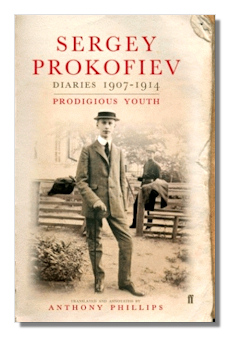
The Internet's Premier Classical Music Source
Related Links
-
Introduction
Acoustics
Ballet
Biographies
Chamber Music
Composers & Composition
Conducting
Criticism & Commentary
Discographies & CD Guides
Fiction
History
Humor
Illustrations & Photos
Instrumental
Lieder
Music Appreciation
Music Education
Music Industry
Music and the Mind
Opera
Orchestration
Reference Works
Scores
Thematic Indices
Theory & Analysis
Vocal Technique
Search Amazon
Recommended Links
Site News
 Book Review
Book Review
Sergey Prokofiev

Diaries 1907-1914
Prodigious Youth
Translated and Annotated by Anthony Phillips
Cornell University Press, 2006. 835 pages
ISBN-10: 080144540X
ISBN-13: 978-0801445408
When he was twelve, Prokofiev's mother presented him with a sumptuous notebook and recommended that he write down all his thoughts in it. The ultimate result of that was the publication, many years later, of 2400 pages in three heavy volumes, of his thoughts and activities from 1907, when he was sixteen, to the year 1933, when he was back in the Soviet union after years of exile and it was unwise to keep a record of one's thoughts. The length of this may sound intimidating, but as it happened Prokofiev had a great talent for writing prose as well as music. The diaries are perhaps best savored in small installments, as they were of course written, rather than raced through in an attempt to get to the end.
This first volume begins when Prokofiev had been at the St. Petersburg Conservatory for three years, and was now studying theory with Lyadov and conducting with Tcherepnin. Eventually, we read a lot about Tcherepnin, but very little about Lyadov or theory. What most seemed to interest him at sixteen, and for some time after that, was girls. He seems to have known, and evaluated on the basis of appearance, personality and musical talent, just about all the female students at the Conservatory. What's more, he kept falling in and out of love with a remarkable number of them. He eventually became disillusioned with several of his girl friends, but he was close friends with many more, simultaneously at that. Interestingly, these girls felt free to telephone him constantly and take long walks with him. Some fell in love with him on account of his music. But the proprieties were preserved. As far as one can tell, he never went beyond kissing any of them at this stage of his life. At the end of this volume he was seriously in love with a young woman named Nina. We are left hanging at the end of the volume. Fortunately, the following volume is waiting for us.
Prokofiev came from an upper middle class family, not so prosperous after his father died, although his mother seemed to be comfortable even after Prokofiev went rapidly through about 4500 rubles he inherited. Bowing to acquaintances was de rigeur; failure to do so constituted a snub – usually deliberate in Sergey's case. He was not always kind or considerate and he was an incorrigible tease. Although when brought to his attention that he had truly hurt the feelings of a girl he admired he resolved to be nicer. One practice he maintained was formal visiting on holidays, name days and birthdays, and sent an extraordinary number of postcards when traveling. He was also a fancy dresser. He was generous to his friends, notably one named Max, talented but poor, who shot himself fatally, to the great distress of Prokofiev. He was also extremely interested in chess and became very good at it. And he worked out regularly at some kind of athletic facility.
Now, about his music. While at the conservatory in his last couple of years, Prokofiev studied only piano and conducting. Eventually he won a grand prize of a grand piano for his pianism while playing his first piano concerto, as is rather well known. What is less well known is that in this period he also completed his second piano concerto, his first two piano sonatas, several short piano pieces, a cello/piano piece, and some vocal works. He also began his first Violin Concerto and a ballet for Diaghilev. He managed to publish most of these works. He was already recognized as a composer second only to Stravinsky among modern Russian composers. He was also becoming accomplished as a conductor, as well as pianist, and won engagements performing in both capacities.
This is a great read. Highly recommended.
Copyright © 2013, R. James Tobin



















